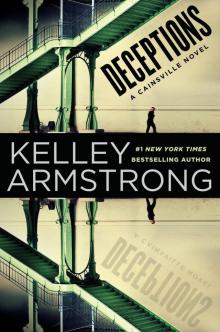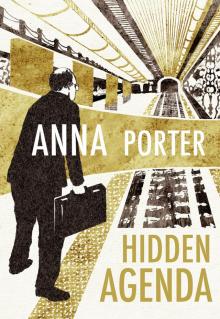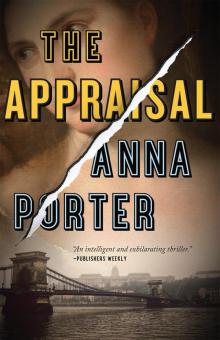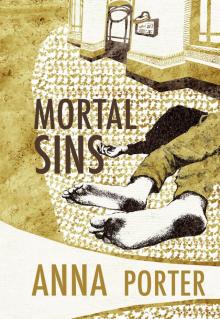- Home
- Anna Porter
Hidden Agenda Page 2
Hidden Agenda Read online
Page 2
She had seen Harris coming onto the platform. His right hand had been in his trouser pocket. His raincoat was open, loose, the belt swinging as he walked. Such a distinguished-looking man, graying at the temples. Couldn’t have been much more than fifty. He had hurried to the end of the platform—the north end.
“To think now what his purpose was!” she said with a sigh. “What a horrible waste. And why would anyone choose such a messy way?”
“Did you actually see him jump?”
“No. I heard him hit, though. Sounded like a ripe pumpkin hitting the pavement. It was the black woman who screamed. She kept screaming afterward too. Very emotional they are, on the islands. Though I daresay they see more violent deaths than we do. She wasn’t so far from where I was. I saw she had her mouth open. She’d dropped her bag.” She was quite certain the black woman must have seen the man jump.
Parr offered to drive Mrs. Hall home. It was more or less on his way.
She obviously enjoyed the idea of sitting in a police car. Her one regret was that Detective Inspector Parr would not tell her the name of the deceased. He couldn’t, before notifying the next-of-kin.
Two
JUDITH DECIDED IT was time for her to draw up a will. Nothing fancy, mind you, no heavy legalese, just the basics, in her own words. At age thirty-eight, a responsible person must have a will. Even if she wasn’t consistently responsible. A will is something like a stocktaking.
I, Judith Hayes, being of sound mind (mostly) and body (still holding on), do on this day, April 9, 1985, leave all my clothes to my daughter Anne. My new sling back sandals can be held in trust for her until she is old enough to wear them. She’s certainly big enough to wear them. My son, Jimmy, can have the typewriter, and the two of them can wrangle over the couch, the chairs and all the stuff in the kitchen. They can have their own beds. They can split the insurance dough. Their father had better take over the mortgage payments on the house. For all I care, he can even move in with them. I don’t wish to have my kids move to Chicago and live with him.
She wondered if she could be quite as specific in a will and whether her instructions would be followed because they were in a will. Could James just declare himself legal guardian, or next-of-kin, or whatever, sell off the house (all the blood-sweat-and-tears to keep it these past seven years) and move the kids to that glass and chrome tower he called home in Chicago? She should probably postpone all thoughts of dying until she had ascertained what her rights would be afterward.
She climbed out of bed and padded down to the kitchen to make herself a cup of coffee. Naturally there was no milk in the fridge. Anne drank about a quart a day, and all those brilliant plans for the kids to keep an up-to-date shopping list on the little blackboard Judith had bought for the purpose had long been abandoned. The idea had been that when you finished something, you wrote it on the board.
No bread either. She didn’t care so much about that, but the kids would notice when they got out the jar of peanut butter for their early morning treat. Serve them right.
The black coffee tasted stale, but it would wake her up and might get rid of the pounding in her head. There was a time when she could stay up till 4:00 a.m. drinking, talking and smoking cigarettes. Now, just a few drinks and she had a thumping hangover. Still, she was entitled to one the day after her thirty-eighth birthday. Fair way on the downhill slope. What gets you is knowing all the things you will never be when you grow up. For example, she would never be a great dramatic actress, or a ballet star, or a famous inventor. She’d never even be rich, damn it. Not even the editor of the lousy Toronto Star, let alone The New Yorker. Self-pity, Marsha had said…on your thirty-eighth birthday you are entitled to indulge in some self-pity. And double martinis on the rocks—hang your diet—and chain-smoking that last package of Rothmans Specials, and staying up until you’re ready to drop—alone, or otherwise. She had had a few friends over for a late dinner, but had never quite found the courage to tell them what the occasion was. Allan Goodman had come with two bottles of Asti Spumante, a poor substitute for champagne, and barely enough to go around, but OK for toasting an evening if you weren’t having a birthday. And it hadn’t been Allan’s fault; he didn’t know. After they left, she had brought out the cake with all thirty-eight pink candles, all her wishes ready before she blew them out. Then she had finished the entire pitcher of martinis. She vaguely remembered having had a discreet little cry on the expedition up the stairs to her bedroom.
After a thorough search, she located the Alka Seltzer and managed to drink about half a glassful without gagging. The rest of it had stopped fizzing anyway. She took her coffee mug upstairs. In turn, as she passed, she banged on the kids’ doors and opened them slightly.
“Time for another fun day at school.”
She had got the idea of banging before she opened the door about a year ago when she found Jimmy examining his balls in the mirror. He had been furious at the intrusion. And she had been a little startled herself.
Anne was pulling her jeans on already. Amazing how that kid never had any trouble waking up.
“Hey, Mum,” she said over one bony shoulder, “had quite a night last night, didn’t you? How is the happy birthday girl this morning?”
“Don’t ask,” said Judith plaintively. “I doubt if I shall survive the day, let alone the next year.”
“Why don’t you go back to bed? We’ll make our own breakfast.”
“Can you get Jimmy out of the sack for me?”
As Judith crawled in between the cooling sheets she heard Anne’s familiar hollering at her brother and the equally familiar grumbling reply. Then the phone rang.
“May I speak to Mrs. Hayes?” a polite male voice enquired.
“I think so,” said Judith cautiously. “Who shall I say is calling?”
“Detective Inspector Parr, of the Toronto Police Department.” A pause. My god, they’re on to me. Parking tickets…those parking tickets I haven’t paid. They’re going to put me in jail. She was still trying to clear her throat when the polite voice came back on the line.
“Hello. Is this Judith Hayes speaking?”
“Yes. This is she,” Judith said firmly and grammatically, remembering to show no weakness in front of the police or they’ll suspect you of more than you’ve committed. An armed robber she had once interviewed in the Kingston pen had given her that piece of advice. Why was it that policemen always made her feel guilty, even now that most of them were younger than she was?
“Mrs. Hayes, I’m afraid I have rather bad news for you,” said Parr, in the soft, modulated tone he had developed for such occasions. “Mr. George Harris died late last night. It was a… sudden…death.” He let that sink in, then went on quickly, “I was told by Mrs. Harris that you were with her husband yesterday. I wondered if I might come around and ask you a few questions.”
Oh god.
Parr waited a while, then asked: “You did see him yesterday?”
“How did he…?” Judith choked on the last word. She was going to call him today. He had looked so well. Happy, really.
“It happened on the subway,” Parr said not very helpfully. “You did see him yesterday?”
“Yes, we spent a couple of hours together. Did he have a heart attack? Did you say on the subway?”
“We haven’t determined the cause of death yet,” Parr interrupted. “May I come over this morning? It will only take a few minutes.”
“Well, I had planned to…” Oh, what the hell. The day lay about her in ruins already. “Why?”
“It would appear you may have been the last person to talk to Mr. Harris. Routine questions, Mrs. Hayes. It’s what we do.”
“OK,” she said, hesitating.
“Fine. I’ll be there in ten minutes.”
“Now, wait a minute. I’ve only just…” but the line was already dead. Damn him. Inconsiderate bastard.
She jumped out of bed, yanked her nightgown over her head, threw it back onto the pillow in almost the same mov
ement and grabbed some underwear from the top drawer of her dresser.
“There’s no bread,” Jimmy said accusingly. He was leaning against the open door wearing torn jeans, a stretched sweater and his best tough-male pose. Cute.
“I have no time for that now, Jimmy. If you want bread, you can write it on the blackboard, or you can get it yourself.” She took out a bulky black sweater. Like Jimmy’s, it was guaranteed to hide all imperfections. Color appropriate too. What the hell did George have to go and die for anyway?
“Something wrong, Mum?” Jimmy’s voice rose a little and he abandoned the hunched-shoulders-forward segment of the macho stance.
“Somebody I know just died.” No tears. Swallow hard.
“Who?”
“George Harris, the publisher. You met him. He was a friend.” She pulled on a pair of tailored slacks. They were new, with razor-sharp seams, and made her feel a little less like falling over.
“Hey, Anne,” Jimmy yelled. “Can you put the kettle on? Mum would like another cup of coffee.”
If Judith had had time, she would have gone over and hugged him. As it was, she just smiled at him in the mirror.
“You should see yourself,” Jimmy said helpfully. “Must have had quite a night of it.”
“You should see yourself,” growled Judith. “I still remember when you liked to have your pants in one piece. Takes some asshole in the East End of London to start it, and all you kids think it’s cool to have more holes than pants. Cool all right. Specially in the middle of April.” Jimmy shuffled his feet for a second. Then he must have decided to let it go. She loved him for it.
Judith examined her face in the bathroom mirror. Even in this dim light it looked dreadful. Dark patches under the eyes, slight sag where the lines were etching themselves further in. She breathed in deeply to make sure her lungs were both still there, then alternated splashing hot water and cold water on her face.
“Jimmy just told me about Mr. Harris dying,” Anne said as she deposited a cup of coffee on the cracked toilet lid. “Terrible. He was such a nice man.” Anne sat on the rim of the bathtub.
“He wasn’t that old, was he?” Jimmy asked.
“Look you two, I’d love to have your company for the rest of the day, but you have school and I have a policeman coming around in about five minutes. So please…”
They left, reluctantly.
“Are you going to be all right?” Anne asked from the stairs.
“Yes. I’ll be fine, thank you. I mean I’ll be OK.” Judith coated her face with darker-than-skintone, cover-all, pan-stick make-up. It smoothed over the creases and added a touch of color.
“Not much of a birthday, is it?” Anne yelled.
“Your presents were good. Jimmy, where did you find that chime?”
“Chinatown. I wanted silk slippers but didn’t know your size.”
“Marsha’s coming today, isn’t she?”
“I sure hope so.”
Judith outlined her eyelids in gray. It was a good color to lift up the green of her eyes, which needed all the help they could get. She picked a smoke-black mascara and pale lipstick.
“Are you kids still down there?” she shouted, feeling a little stronger. She never knew what to say or how to behave, other than busy, when people died—she had never been a good weeper. Must be a fear of losing control—that was Marsha’s theory, at any rate. Marsha had endless theories about human behavior, and she had majored in Judith’s special fears.
“Mum, I’ll get the bread,” Jimmy called, “and milk. OK? You can pay me back later.”
Fabulous kids.
“Great. Thanks. Listen, tell you what, I’ll make you guys a sumptuous dinner if you come home in time. We can all eat together.”
Detective Inspector Parr was at the door. Judith grabbed for her hairbrush and whipped it through her long auburn hair. It needed washing, but even so, it was her best feature.
Anne opened the door and she and Jimmy left, making room for Parr to enter.
Detective Parr was not the type. The last time she had talked to a police detective, he had been ex-army, sturdy and square-shouldered. This one was thin and angular, fortyish, tall enough to have to duck at the door. His eyes squinted under heavy eyebrows. He wore a tweed jacket with oversize brown buttons, dark gray pants, a creased white shirt open at the neck and a stained blue-gray tie that had slipped askew.
“Mrs. Hayes?”
“Yes. Detective Inspector Parr, I assume. Come on in,” Judith said coolly since he was already progressing toward the living room. He threw his raincoat over the back of a chair and scanned the room quickly. “Must have had a bit of a party here last night,” he smiled.
“A birthday party. Sort of. Do sit down.”
He chose a straight-backed chair by the dining room table and pushed aside a few of last night’s dishes, all business.
“We’ll make it as brief as possible.” He flicked open his notebook. “I understand you were interviewing Mr. Harris yesterday.”
“Yes, I was commissioned by Saturday Night magazine to write a profile of George Harris and his publishing house. Yesterday was our second interview.”
“You’ve known him for some time?” Parr said.
“Yes. I worked for him once. Briefly. In the editorial department. Of course, I’ve seen him since. Parties and that. Lunch sometimes. I liked him—a lot. I think everybody liked him. He was that kind of man.” That’s another thing about talking to policemen—they make you prattle on like an idiot.
“Yesterday, how did he seem to you?”
“Perfectly normal, I thought. He did complain a bit about his financial problems, but that’s par for the course. You can’t run a good publishing house in Canada without having financial problems. He seemed very healthy.”
“Did you think he was at all depressed?”
“Depressed? No. Why?… You’re not suggesting he committed suicide…?”
“I’m afraid it’s possible he may have,” Parr said gravely.
“I don’t believe it!” Judith gasped. “He just wouldn’t have.” She stood up and turned her back to the policeman, swallowed hard, smoothed over her face and her voice. “Would you like a cup of coffee? The kettle just boiled.”
“Please. If it’s not too much trouble.” He was grateful she had gone into the kitchen. There had been more than enough tears already. The wife had had a hysterical screaming fit, then fainted. That was while he was standing at the door. The son was there, visiting, a fortunate coincidence that saved Parr from having to lug the unconscious Mrs. Harris into her house. Besides, he could not have left Mrs. Harris on her own. Harris Jr. had accompanied him to the hospital to identify the body.
Judith came back with a tray.
“How did it happen?” she asked.
“He fell or jumped in front of a subway train at Rosedale. We don’t know for sure which.”
Judith sighed and took a long sip of hot coffee. He wouldn’t have jumped—not George. He was such a fastidious man. Even if he had intended to kill himself, he would have chosen a much more genteel way. Pills, for example.
“And you’re sure he didn’t seem at all unusual yesterday? What did he talk about?”
“Himself, mostly. And books. He had great hopes that he could pull Fitzgibbon & Harris out of debt by the end of the year. He had a very good list coming up this Fall. He knew he had a big winner. There had been some lean years, but he thought they were now behind him. Of course he knew the company would never get rich, but being out of debt would have meant a lot to him.”
“Would mean a lot to anybody,” Parr said, mostly to himself. “Harris Jr. gave me the impression that the lean years were very lean indeed. Wasn’t he into the bank for a couple of million or more?”
“About two. But George was hanging in. And, as I said, he was optimistic. He seemed sure of himself.”
“Would it have been realistic for him to think that one good list—how many books is that?”
�
�I don’t know. Maybe thirty-five…”
“Well, could those books alone have got him out of debt?”
“Point is he believed it. While he believed it, he had something to fight for, and while he had something to fight for, he would not have given up. Not George.”
Parr didn’t mind her getting angry. As long as she didn’t cry. He sipped his coffee and nodded reassuringly.
“What time did you leave his office?”
“Around 9:30. We were going to continue the interview next week. I was to call him today and set up a time. He thought he would have a drink with Marsha Hillier and me this afternoon.”
“Who?”
“Marsha Hillier—a publisher in New York. She’s coming because it’s my birthday.” That’s the second time she had brought up the birthday in less than half an hour. Last night she hadn’t told her friends, now she insisted on telling the policeman. Perhaps early senility?
“I’m sorry.”
Why was he sorry? It wasn’t his birthday.
“Did you and Harris leave his office together?”
“No. He said he had some work to finish and phone calls to make. He had a lot to do still. He couldn’t have been planning to kill himself.”
***
Once Parr had collected his raincoat and she was alone, Judith lit her first cigarette of the day and poured herself a generous Bloody Mary.
“That’s for you, George,” she said as she took a sip. “You never liked long faces or dreary people and you were a firm believer in Bloody Marys before noon.”
She tidied up the kitchen and the living room, then took out the two frozen Quiches Lorraine she had been saving for a special occasion. They would defrost slightly by late afternoon.
It might be wise to invest in a dishwasher, she thought. Kids didn’t like washing dishes any more than she did. If only she could get a big enough assignment, she might even prevail on the plumber to come and they’d have two working toilets again. You couldn’t revel in such luxuries on $1,500 a month—when the going was good—and two growing kids. That’s another thing: at fourteen and sixteen, respectively, shouldn’t they stop growing soon? It would make a hell of a difference to the clothes budget. Even if Jimmy enjoyed having his jeans in tatters, he did like them to reach his ankles.

 Deceptions
Deceptions Hidden Agenda
Hidden Agenda The Appraisal
The Appraisal Mortal Sins
Mortal Sins In Other Words
In Other Words